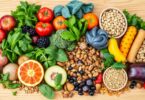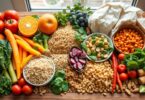As Jean-Jacques Rousseau astutely observed, “Nature never deceives us; it is we who deceive ourselves.” This maxim is particularly pertinent in the context of plant-based nutrition. In a society dominated by processed, artificial foods, there is a resurgent interest in returning to natural, wholesome sources of nutrition. These are the sustenance forms our bodies were inherently designed to flourish on.
Welcome to your comprehensive guide to plant-based source – a journey into the realm of natural nutrition that will empower you to nourish your body, mind, and soul. Whether you’re a seasoned plant-powered diet enthusiast or just starting to explore the benefits of a vegan nutrition lifestyle, this article will equip you with the knowledge and inspiration to unlock the full potential of a plant-based lifestyle.

Key Takeaways
- Discover the foundations of a plant-based diet and its key nutrients
- Explore common misconceptions about plant-based eating and the science behind it
- Learn about essential plant-based protein sources and how to maximize nutrient absorption
- Dive into the world of plant-based vitamins, minerals, and their health benefits
- Understand the environmental impact and sustainability of a plant-based lifestyle
Understanding the Foundations of Plant-Based Nutrition
The rise in popularity of plant-based diets necessitates a grasp of its foundational principles. These diets are not just a trend; they offer substantial health benefits. They contribute to cardiovascular health and aid in weight management. We will examine the essential nutrients in plant-based diets, dispel common myths, and explore the scientific basis of this holistic nutrition approach.
Key Nutrients in Plant-Based Diets
Contrary to common misconceptions, a well-structured plant-based diet can meet all nutritional needs. These diets are abundant in fiber, vitamins, minerals, and phytochemicals, promoting overall health. Key nutrients include:
- Protein from sources like lentils, beans, and soy
- Iron from leafy greens, tofu, and fortified grains
- Calcium from plant-based milk alternatives, leafy greens, and nuts
- Omega-3s from chia seeds, flaxseeds, and walnuts
Common Misconceptions About Plant-Based Eating
A prevalent myth is that plant-based diets lack essential nutrients. Yet, research affirms that a well-planned vegan diet can supply all necessary nutrients for bodily functions. Another misconception is that plant-based diets are unvaried and tasteless. However, the diversity and flavor of plant-based ingredients and recipes refute this notion.
The Science Behind Plant-Based Nutrition
Extensive research supports the health benefits of plant-based diets. These diets have been associated with lower risks of chronic diseases, enhanced heart health, and effective weight management. The high fiber, antioxidant, and phytochemical content in plant-based foods are pivotal in supporting well-being and longevity.
“A plant-based diet is not just about what you don’t eat, but about what you do eat – a abundance of fruits, vegetables, whole grains, legumes, nuts and seeds.”
Essential Plant-Based Sources of Protein
In the quest for a balanced, nutritious diet, plant-based proteins have become crucial. The spectrum of options, from legumes to nuts and seeds, caters to various dietary needs. These sustainable proteins are vital for a healthy lifestyle, offering a variety of choices to enhance your diet.
Legumes, such as lentils, chickpeas, and black beans, stand out as protein powerhouses. They are not only high in protein but also rich in vitamins, minerals, and fiber. Adding these versatile foods to your meals can significantly reduce your reliance on meat alternatives.
- Lentils: Boasting 18 grams of plant-based protein per cooked cup, lentils are a nutritional powerhouse.
- Chickpeas: Known as garbanzo beans, they offer 15 grams of plant-based protein per cooked cup.
- Black Beans: With 15 grams of plant-based protein per cooked cup, black beans are a versatile addition to any sustainable proteins repertoire.
Nuts and seeds also serve as excellent plant-based protein sources. Almonds, walnuts, chia, and flaxseeds are packed with nutrients. These ingredients can be easily added to snacks, salads, and baked goods. Their unique textures and flavors enhance any vegan dish, making them essential in a plant-based diet.
“Plant-based proteins are not only sustainable, but they also offer a wealth of additional health benefits that animal-based proteins may lack.”
The variety of meat alternatives available today makes it easier to achieve a protein-rich plant-based diet. From soy-based burgers to seitan-based chicken substitutes, these products can replace traditional animal proteins. They provide the essential nutrients your body needs.
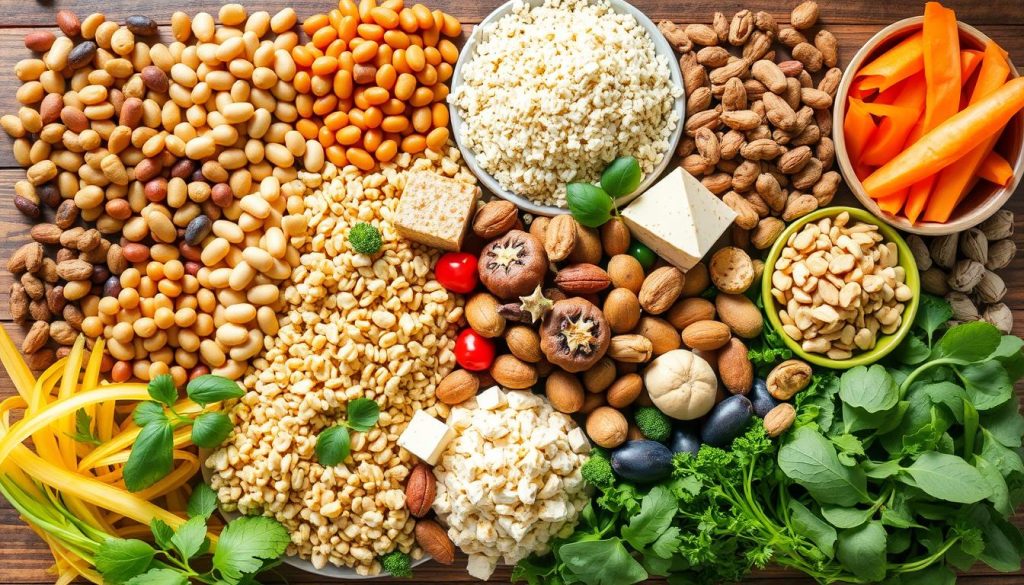
Incorporating a variety of plant-based protein sources into your meals meets your nutritional needs and supports a sustainable diet. Explore the world of sustainable proteins and discover new culinary possibilities that benefit both your health and the environment.
Maximizing Nutrient Absorption from Plant-Based Foods
In the realm of plant-based nutrition, the key to success lies in optimizing nutrient absorption. This can be achieved through a deep understanding of food combinations, preparation methods, and the roles of enzymes and probiotics. Such knowledge empowers you to fully harness the nutritional benefits of your plant-based diet.
Combining Foods for Optimal Nutrition
It’s fascinating to discover that some plant-based foods complement each other perfectly. For example, vitamin C-rich foods like bell peppers or citrus fruits can significantly enhance iron absorption when paired with iron-rich legumes. Similarly, combining healthy fats with carotenoid-rich vegetables, such as avocado with carrots, boosts the bioavailability of these fat-soluble nutrients.
Food Preparation Techniques
The method of preparing your plant-based meals can significantly influence nutrient absorption. Techniques like cooking, soaking, or fermenting certain foods can break down cell walls, releasing more nutrients for your body to absorb. For instance, steaming or sautéing greens can make vitamins and minerals more accessible than raw consumption.
The Role of Enzymes and Probiotics
“Enzymes and probiotics play a crucial role in unlocking the full nutritional potential of plant-based foods.”
Digestive enzymes are essential for breaking down complex plant compounds, making nutrients more accessible. Probiotics, the beneficial bacteria in your gut, also play a vital role in nutrient absorption by supporting digestive function. Incorporating foods rich in enzymes, such as pineapple or papaya, and probiotic-rich fermented foods can enhance your plant-based nutrition.
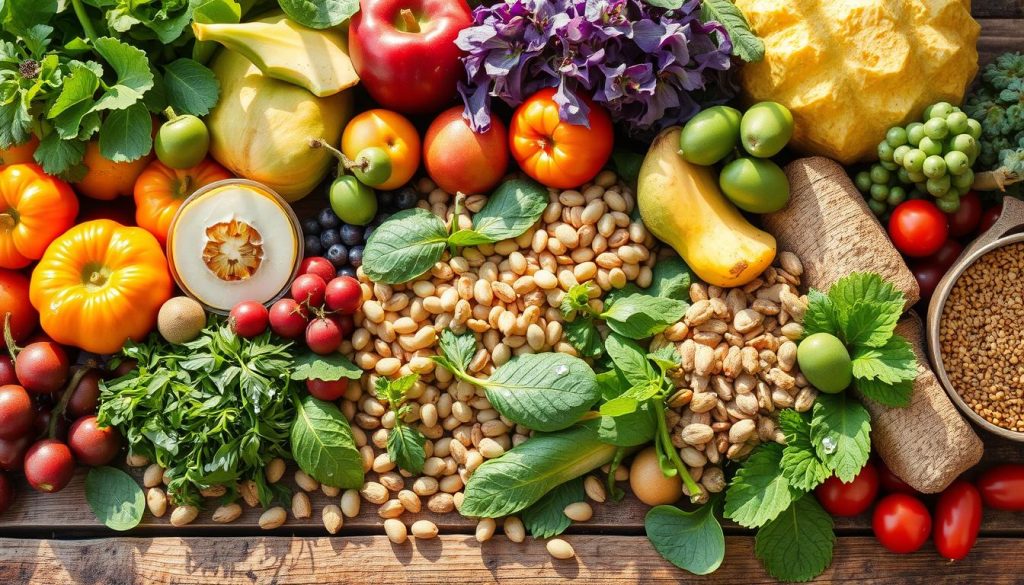
By mastering these strategies, you can significantly improve nutrient absorption from your plant-based diet. This approach ensures you reap the maximum benefits of plant-powered nutrition.
Plant-Based Source: Complete Guide to Vitamins and Minerals
The rise in popularity of plant-based diets underscores the need to grasp the significance of obtaining vital vitamins and minerals from such sources. This detailed guide aims to illuminate the essential nutrients inherent in vegan or vegetarian lifestyles. It empowers you to enhance your plant-based nutrition effectively.
Unlocking the Power of Plant-Based Vitamins
Plant-based vitamins, including A, C, and E, along with the critical B-complex, can be adequately sourced through a well-structured vegan nutrition plan. Delve into a spectrum of colorful fruits, vegetables, whole grains, and legumes to guarantee your daily vitamin intake.
The Importance of Plant-Based Iron and Calcium
Contrary to prevailing myths, plant-based iron sources and plant-based calcium sources are abundant in plant-based diets. Leafy greens, tofu, fortified plant-based milks, and legumes stand out as prime choices for robust bones and optimal blood health.
“A well-planned plant-based diet can provide all the essential vitamins and minerals your body needs to thrive.”
Supplementing with Care
Even with a balanced plant-based diet, there might be scenarios where specific supplements, like vitamin B12 or omega-3s, are advantageous. Seek advice from a healthcare professional to ascertain your specific needs. This ensures you meet your plant-based vitamins and mineral requirements optimally.
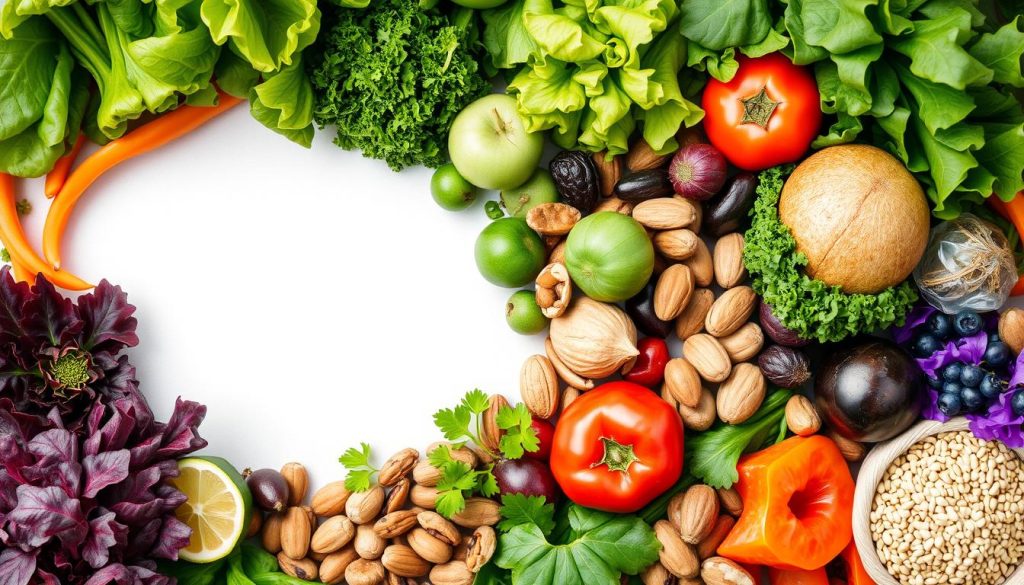
Adopting a plant-based lifestyle opens up a realm of nutritional opportunities. By grasping the fundamental vitamins and minerals in vegan and vegetarian diets, you can unlock the complete potential of plant-based nutrition. This allows you to nourish your body with the finest offerings from nature.
Sustainable and Eco-Friendly Plant-Based Options
The rise in demand for eco-friendly food and ethical eating has spotlighted the plant-based lifestyle as a sustainable choice. Adopting plant-based nutrition brings numerous benefits, enhancing both personal health and environmental well-being.
Environmental Impact of Plant-Based Diets
Research indicates that plant-based diets significantly reduce environmental impact compared to diets high in animal products. By opting for sustainable proteins like meat, dairy, and eggs less, we lower our carbon footprint. This action conserves natural resources and aids in combating climate change.
Seasonal Eating Guidelines
Adopting a seasonal eating approach is crucial to maximize plant-based lifestyle benefits. Opting for locally sourced, eco-friendly food in season supports local agriculture. It also minimizes environmental impact from long-distance transportation and storage. This simple change can drastically reduce our carbon footprint and foster a more sustainable food system.
“Embracing a plant-based diet is one of the most impactful actions individuals can take to reduce their environmental footprint.”
By choosing to incorporate more plant-based options into our diets, we contribute to a healthier, more sustainable future. Whether through exploring new ethical eating recipes or supporting local, seasonal produce, each step toward a plant-based lifestyle is significant.

Building Strong Bones with Plant-Based Calcium Sources
Maintaining strong and healthy bones is essential for overall well-being. A plant-based diet can be an excellent way to achieve this. While many people associate dairy products with calcium, numerous plant-based calcium sources can help build and maintain strong bones.
The primary benefit of a plant-based diet for strong bones lies in the abundance of vegan food benefits. These foods not only provide calcium but also essential nutrients like vitamin D, magnesium, and phosphorus. All these nutrients play a vital role in bone health.
- Leafy greens like kale, spinach, and collard greens are excellent sources of calcium and other bone-supporting nutrients.
- Tofu, tempeh, and other soy-based foods are rich in calcium and can be easily incorporated into various plant-based meals.
- Nuts and seeds, such as almonds, chia seeds, and sesame seeds, are also great plant-based calcium sources.
It’s important to note that while plant-based calcium sources are abundant, the body’s ability to absorb calcium can be influenced by various factors. Ensuring adequate vitamin D intake, either through sun exposure or supplementation, can help optimize calcium absorption and support overall bone health.
“Incorporating a variety of plant-based calcium sources into your diet can be a delicious and sustainable way to build and maintain strong bones.”
By making conscious choices to include a variety of plant-based food for strong bones, you can actively support your skeletal health. This approach also allows you to enjoy the many vegan food benefits that a plant-based lifestyle offers.
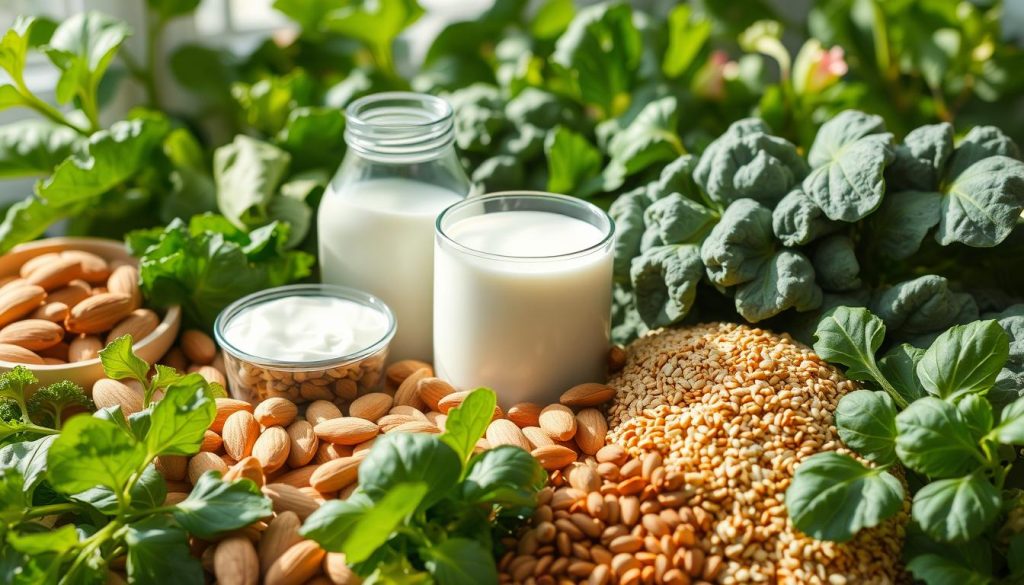
Plant-Based Omega-3s and Brain Health
The significance of omega-3 fatty acids for brain health is paramount. While fish-based sources are commonly recommended, numerous plant-based omega-3 sources also offer substantial benefits for both mind and body.
Best Sources of Plant-Based Fatty Acids
Integrating plant-based foods for mental clarity into your diet is an excellent strategy for enhancing cognitive function. The leading plant-based omega-3 sources include:
- Flaxseeds and flaxseed oil
- Chia seeds
- Walnuts
- Leafy greens like spinach and kale
- Algae supplements
These vegan food for energy options are rich in alpha-linolenic acid (ALA), a precursor to the more active forms, EPA and DHA, which the body can convert.
Cognitive Benefits of Plant-Based Nutrients
Plant-based diets are not only rich in omega-3s but also in other nutrients that bolster brain health. Antioxidants, abundant in berries and leafy greens, shield brain cells from oxidative stress. Meanwhile, B vitamins, found in whole grains and legumes, are essential for energy metabolism and nerve function.
“Incorporating a variety of plant-based foods for mental clarity can have a profound impact on cognitive performance and long-term brain health.”
By deliberately choosing to include these plant-based omega-3 sources and other brain-enhancing plant-based foods in your diet, you can significantly enhance your mental and physical well-being. This approach ensures sustained energy and focus throughout the day.
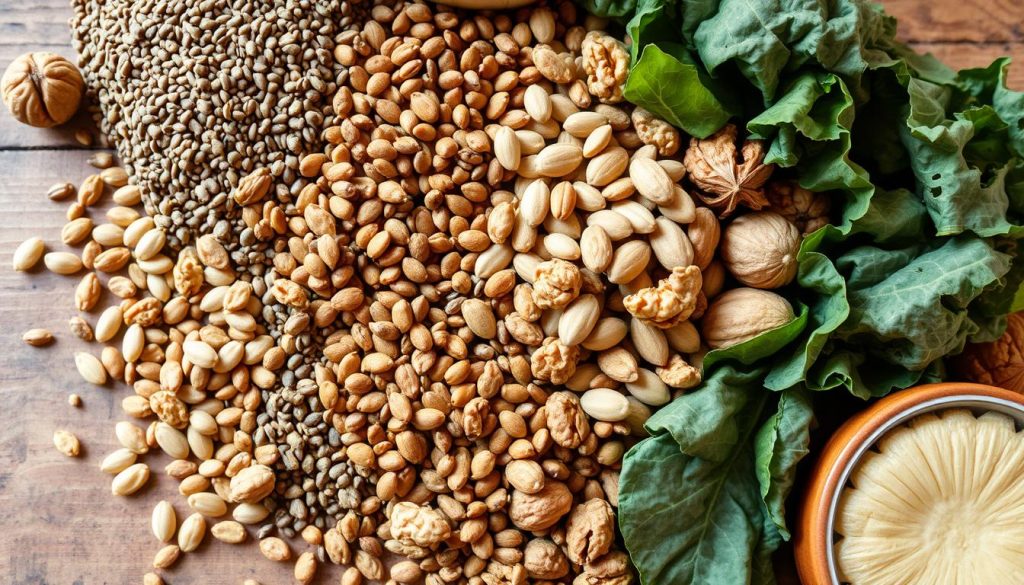
Optimizing Athletic Performance with Plant-Based Nutrition
As athletes, we continually seek enhancements in our physical and mental prowess. The advantages of a plant-based diet for fitness may seem obscure at first glance. Yet, scientific evidence reveals a different narrative. Adopting a plant-based nutrition for athletes opens up a realm of unexplored potential, providing the necessary nutrients for peak athletic performance.
Concerns about protein intake are common among plant-based athletes. Yet, a thoughtfully crafted plant-based diet for muscle building can meet these needs. Legumes, whole grains, nuts, and seeds are prime sources of protein, crucial for muscle development and repair.
- Lentils, chickpeas, and quinoa are rich in plant-based protein and essential amino acids.
- Almonds, chia seeds, and hemp seeds are excellent for plant-based protein and healthy fats.
- Tofu, tempeh, and seitan are versatile plant-based proteins suitable for various dishes.
Meeting energy demands is another critical aspect for plant-based athletes. A well-structured plant-based diet for fitness ensures the intake of carbohydrates, healthy fats, and micronutrients. Foods like sweet potatoes, avocados, and leafy greens are vital for maintaining energy and aiding in recovery.
“A plant-based diet can provide all the nutrients necessary for optimal athletic performance and recovery.” – Dr. Anita Vandyke, Sports Nutritionist
Embracing a plant-based nutrition for athletes not only enhances physical performance but also promotes overall health and wellbeing. With the correct mix of plant-based foods, we can reach our fitness objectives while reducing our environmental footprint.
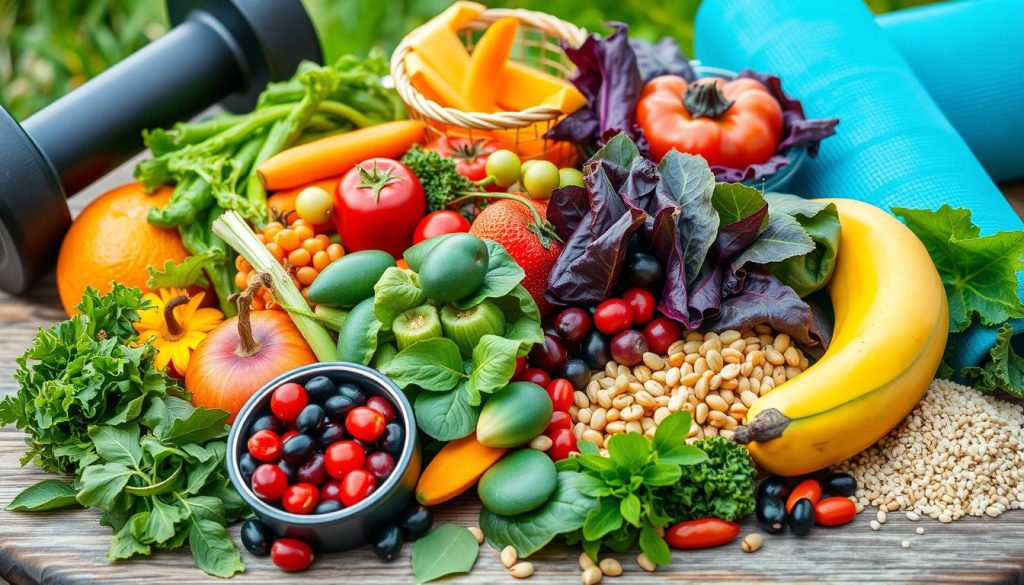
Natural Plant-Based Solutions for Weight Management
Embracing a plant-based diet can significantly aid in achieving a healthy weight. It’s crucial to recognize how certain plant-based foods can enhance metabolism and induce lasting satiety. By leveraging the inherent benefits of these nutrient-rich ingredients, you can effortlessly reach your plant-based diet for weight loss or plant-based diet for weight management objectives.
Metabolism-Boosting Plant Foods
Some plant-based foods possess the extraordinary capacity to elevate your metabolic rate, facilitating calorie expenditure throughout the day. Notable examples include:
- Spicy peppers, such as chili peppers, which contain capsaicin to increase thermogenesis
- Green tea, rich in antioxidants and compounds that may enhance fat burning
- Whole grains, such as quinoa and oats, which provide complex carbs to sustain energy levels
Satiety-Promoting Plant Components
Aside from their metabolism-boosting properties, many plant-based foods are also abundant in fiber, protein, and other satiating nutrients. These plant-based eating for better health elements, when integrated into your meals, can effectively reduce cravings and bolster your weight management endeavors:
- Soluble fiber from fruits, vegetables, and legumes
- Plant-based proteins like lentils, chickpeas, and almonds
- Healthy fats from avocados, nuts, and seeds
By tapping into the natural advantages of these plant-based superfoods, you can craft well-balanced, fulfilling meals. These meals will not only support your plant-based diet for weight loss but also your plant-based diet for weight management goals.
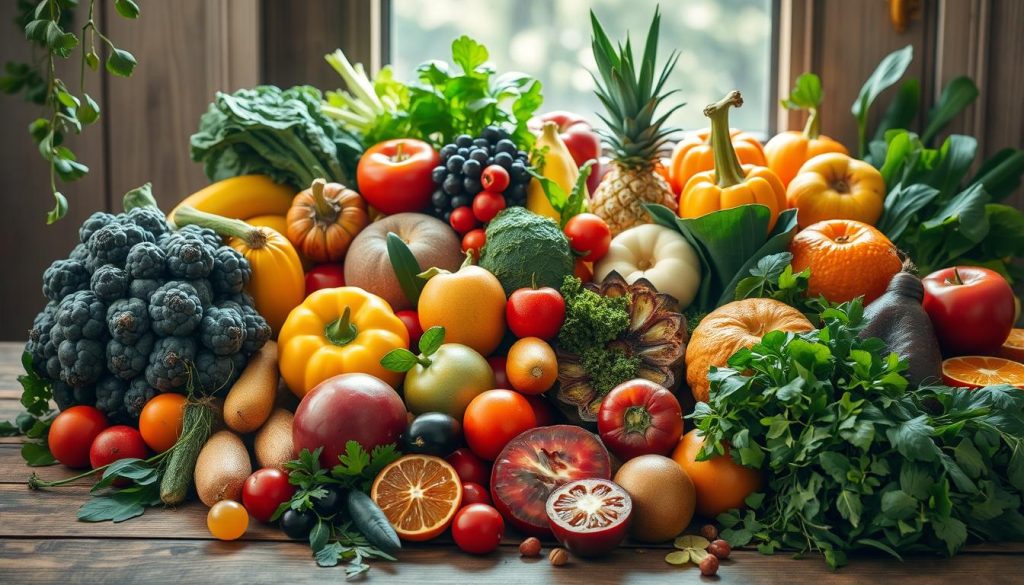
Anti-Inflammatory Benefits of Plant-Based Foods
Consuming a diet abundant in vegan foods for inflammation can yield significant anti-inflammatory advantages. These plant-based items are replete with antioxidants, which are crucial in diminishing body inflammation. Such inflammation is closely associated with a multitude of chronic ailments.
Plant-based foods combat inflammation primarily through their antioxidant content. These compounds neutralize harmful free radicals, thereby preventing them from inducing cellular damage and inflammation. Moreover, a plant-based diet for cholesterol aids in managing heart disease by lowering inflammation and enhancing cholesterol levels.
- Leafy greens such as spinach and kale are abundant in anti-inflammatory compounds like lutein and zeaxanthin.
- Berries, including blueberries, raspberries, and blackberries, contain potent antioxidants that combat inflammation.
- Fatty fish like salmon and mackerel offer anti-inflammatory omega-3 fatty acids. Plant-based alternatives like walnuts and flaxseeds also provide these beneficial fats.
“Incorporating more plant-based foods into your diet is a natural and effective way to reduce inflammation and support your overall health.”
By focusing on vegan foods for inflammation, you can leverage the potency of plant-based antioxidants to manage chronic conditions and enhance overall well-being. A plant-based diet for cholesterol also offers additional cardiovascular benefits.
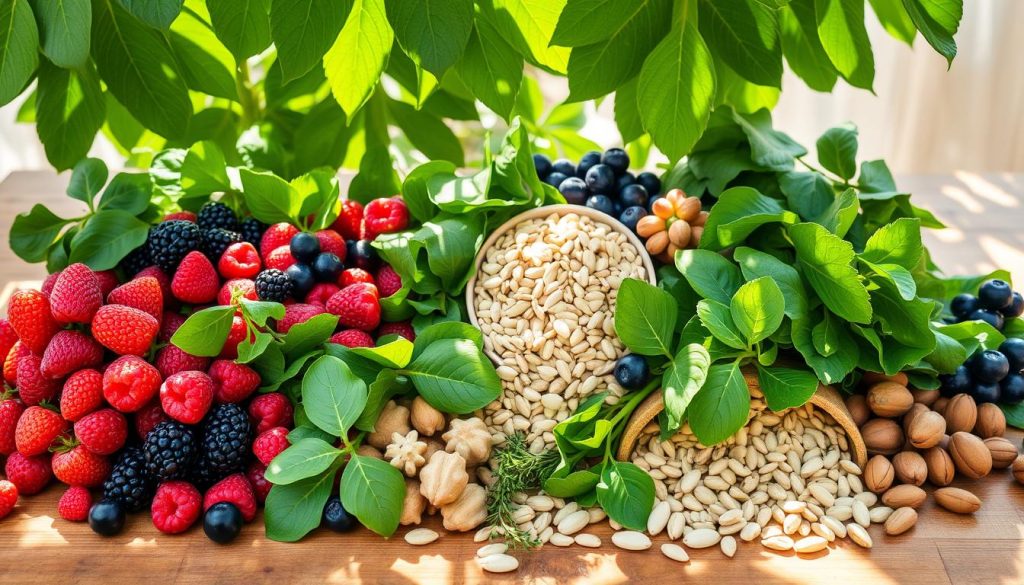
Gut Health and Plant-Based Fiber Sources
Ensuring a healthy gut is crucial for our overall well-being. A plant-based diet can significantly aid in this pursuit. By integrating plant-based foods for gut health, we nurture the diverse microbial community in our digestive system. This leads to enhanced digestion, better nutrient absorption, and a strengthened immune system.
Prebiotic and Probiotic Plant Foods
Prebiotic fibers, abundant in plant-based foods, serve as fuel for beneficial gut bacteria. This promotes their growth and activity. Plant-based sources of fiber like onions, garlic, bananas, and whole grains are prime prebiotic choices. On the other hand, fermented vegetables, tempeh, and miso introduce healthy microbes into the gut, enhancing its balance.
Digestive Health Optimization
Adopting a variety of plant-based foods for digestion can significantly improve gut health. Foods rich in fiber, such as lentils, berries, and leafy greens, aid in bowel regularity and digestive system function. Moreover, enzymes and probiotics in fermented plant-based products facilitate nutrient absorption and alleviate digestive issues.
By focusing on plant-based food for gut health, we unlock our digestive system’s full potential. This promotes overall well-being and supports our body’s natural ability to flourish.
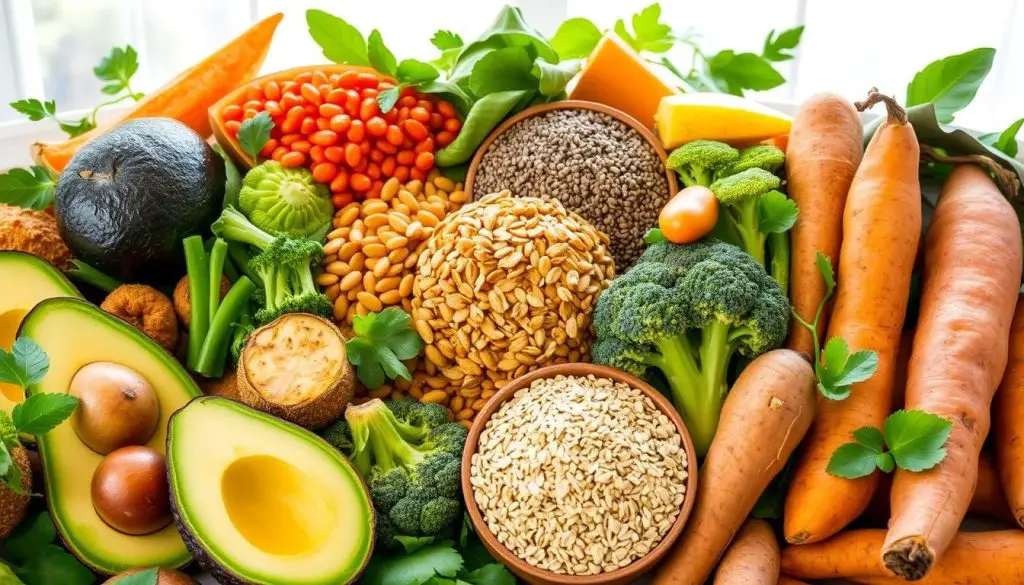
Plant-Based Meal Planning and Preparation
Adopting a vegan meal plan or plant-based diet can be straightforward. With some planning and preparation, you can seamlessly integrate a range of plant-based diet meal ideas into your daily life. Here, we delve into practical strategies for optimizing your plant-based meal prep. These tips aim to enhance your experience of a balanced, plant-based lifestyle.
Mastering the Art of Meal Planning
Effective plant-based meal prep hinges on sound meal planning. Begin by assessing your pantry and fridge, noting the essential plant-based items for meal foundations. Next, devise a weekly menu, incorporating diverse vegan meal plan options to ensure both variety and nutritional value.
- Prepare a shopping list to ensure you have all the necessary ingredients on hand.
- Embrace the power of batch cooking to save time and have ready-to-go meals throughout the week.
- Experiment with different grains, legumes, and vegetables to add diversity to your plant-based diet meal ideas.
Streamlining Your Plant-Based Meal Prep
Efficient plant-based meal prep is crucial for sustaining a healthy, vegan meal plan. Invest in meal prep containers, pre-chop vegetables, and pre-cook staples like quinoa or lentils. This approach enables quick assembly of nutritious meals, even when time is limited.
“Meal planning and preparation are the foundations of a successful plant-based diet. With a little effort upfront, you can enjoy delicious and nutritious meals throughout the week.”
The path to a plant-based lifestyle is uniquely yours. Experiment with various plant-based diet meal ideas to discover what suits you best. Embrace the creativity and relish the journey of nourishing your body with wholesome, vegan meal plan choices.

Supercharging Your Immunity with Plant-Based Foods
As we seek optimal health and wellness, many are embracing plant-based foods to fortify their immune systems. These foods, rich in antioxidants, offer significant health benefits. They are crucial in the battle against illness and disease.
Turmeric, a vibrant yellow spice, is celebrated for its immune-boosting properties. It contains curcumin, a potent antioxidant that combats inflammation and bolsters the body’s defenses. Adding turmeric to your diet, through curries, smoothies, or golden milk, can significantly enhance your immunity.
- Citrus fruits, such as oranges, lemons, and limes, are bursting with vitamin C, a essential nutrient for a healthy immune system.
- Leafy greens, like spinach and kale, are rich in vitamins A and C, as well as antioxidants that can help combat free radicals and support overall immunity.
- Ginger, garlic, and onions are renowned for their anti-inflammatory and antimicrobial properties, making them valuable additions to any plant-based diet.
By prioritizing these nutrient-dense, plant-based food benefits, you can give your immune system the boost it needs to thrive and keep you feeling your best.
“Nourishing the body with a variety of vegan superfoods is one of the most effective ways to support a strong and resilient immune system.”
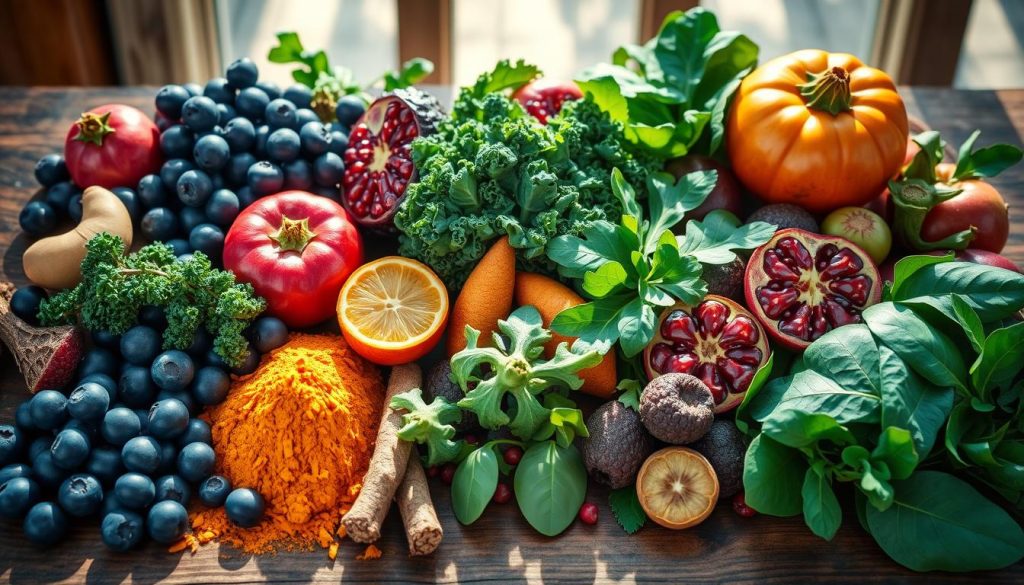
Conclusion
Throughout this guide, we’ve delved into the numerous advantages of adopting a plant-based lifestyle. By integrating natural, plant-based nutrition into your daily life, you tap into a reservoir of essential vitamins, minerals, and antioxidants. These nutrients are pivotal in nourishing your body from the inside out.
The benefits of plant-based eating are vast and well-documented. It enhances your immunity, supports cognitive functions, aids in sustainable weight management, and reduces inflammation. Furthermore, this approach to nutrition significantly minimizes your carbon footprint. This contributes to a greener, more sustainable future for all.
We urge you to continue exploring the realm of plant-based nutrition. Engage in culinary adventures, discover fresh, seasonal produce, and find ways to seamlessly incorporate these principles into your daily life. By embracing the wealth of natural plant-based nutrition, you pave the way for optimal well-being and a more vibrant, healthy you.
FAQ
What is a plant-based diet?
A plant-based diet emphasizes whole, natural foods from plant sources. This includes fruits, vegetables, legumes, nuts, seeds, and whole grains. It focuses on minimally processed, nutrient-dense foods while limiting or avoiding animal-derived products like meat, dairy, and eggs.
What are the benefits of a plant-based diet?
A well-planned plant-based diet offers numerous health benefits. It can improve heart health, aid in weight management, reduce inflammation, and lower the risk of chronic diseases like type 2 diabetes and certain cancers. It also boosts energy, enhances digestion, and improves overall well-being.
How do I ensure I’m getting enough protein on a plant-based diet?
Legumes, nuts, seeds, whole grains, and plant-based meat alternatives are excellent sources of plant-based protein. By incorporating a variety of these foods into your meals, you can easily meet your protein needs without relying on animal products.
What are some common misconceptions about plant-based diets?
Misconceptions include that plant-based diets lack essential nutrients, are expensive or time-consuming, and are only suitable for certain individuals. In reality, a well-planned plant-based diet can provide all necessary nutrients, is affordable and convenient, and is suitable for people of all ages and activity levels.
How can I optimize nutrient absorption on a plant-based diet?
To maximize nutrient absorption, focus on food combining, proper food preparation, and including digestive aids like enzymes and probiotics. These strategies enhance the bioavailability of nutrients from plant-based foods.
What are the best plant-based sources of calcium?
Excellent plant-based sources of calcium include leafy greens, fortified plant-based milks, tofu, tempeh, and certain nuts and seeds. Incorporating these foods into your diet supports strong bones and overall health.
How can I ensure I’m getting enough omega-3s on a plant-based diet?
Good plant-based sources of omega-3 fatty acids include flaxseeds, chia seeds, walnuts, and certain algae-based supplements. These foods support brain health, heart function, and overall well-being.
Can a plant-based diet support athletic performance?
Yes, a well-planned plant-based diet can provide the necessary nutrients for athletic performance, muscle recovery, and overall health. Key considerations include adequate protein, carbohydrates, and essential micronutrients like iron, zinc, and B vitamins.
How can a plant-based diet support weight management?
Plant-based diets are beneficial for weight management due to their high fiber, nutrient density, and lower caloric density. These characteristics promote feelings of fullness, boost metabolism, and support weight loss or maintenance goals.


